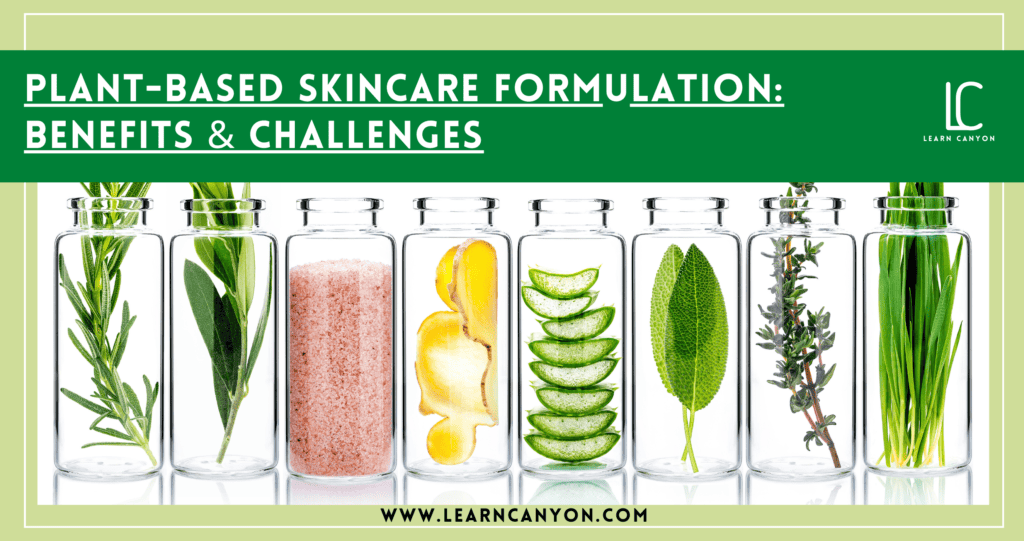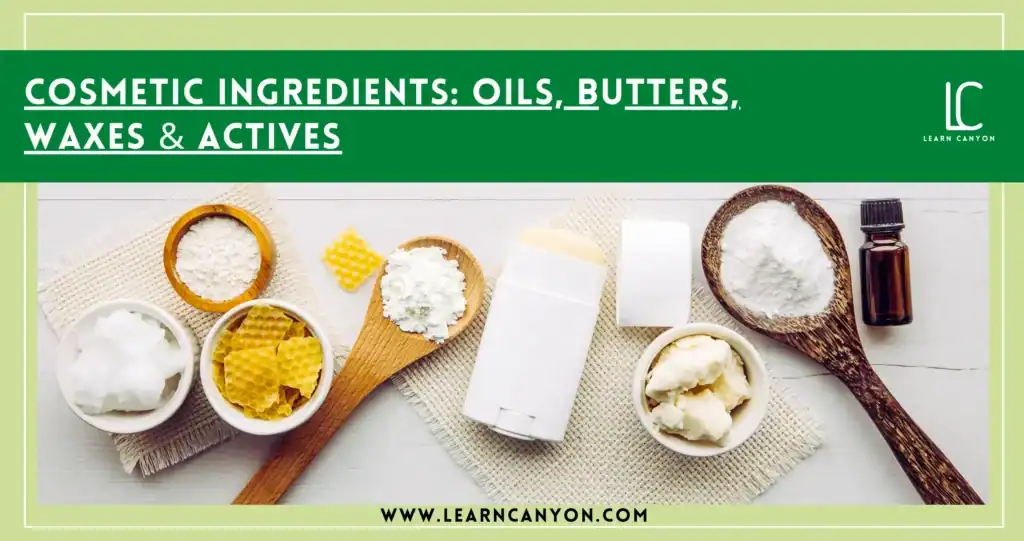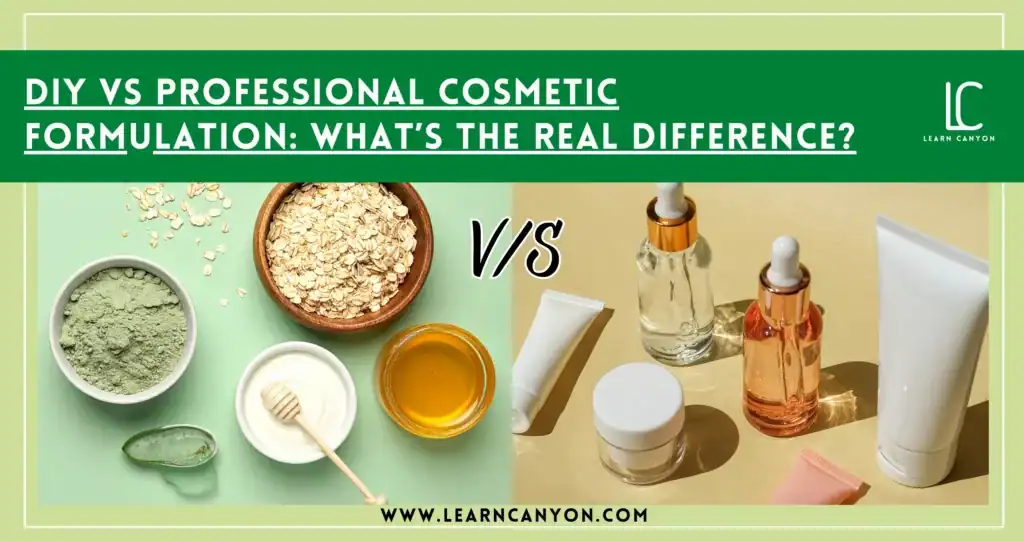In recent years, there has been a growing interest in plant-based skincare formulations. People are increasingly turning to natural ingredients derived from plants for their skincare routines, as they believe in the power of nature to provide effective and gentle solutions for their skin.
According to recent statistics, even Google searches for vegan skincare cosmetics are rising 80% each year.
However, while plant-based skincare products offer numerous benefits, such as being free from harsh chemicals and potentially harmful ingredients, they also come with their own set of challenges.
In this blog post, we will explore the benefits and challenges of plant-based cosmetic formulations, shedding light on why they have gained popularity and what to consider when incorporating them into your beauty routine.
So, if you’re curious about the world of plant-based skincare, keep reading to discover the wonders and complexities of these formulations.
Rise Of Plant-Based Skincare Formulation
Veganism is a developing philosophy in the world that has influenced our way of life for the better. People today have a rising sense of ethical responsibility in all parts of their lives, including their daily cosmetic items.
Consumers are shifting their focus to plant-based skincare items as they become more aware of numerous organic and natural products manufactured with safe components that eliminate the danger of allergic reactions and other skin problems.
According to a recent Fact MR analysis, demand for plant-based skincare products has exceeded $683 million in 2021, with a CAGR of roughly 7.5% until the end of 2031. Digital sales will expand at a 9.9% CAGR.
The market for plant-based beauty goods is expected to rise dramatically in the global personal care industry over the next decade,” Fact MR said.
Among this, the North American market has reached to be worth $319.2 million in 2021, rising at a 5.7% CAGR through 2031, while Europe’s market will be worth $339.6 million that year. Creams and lotions comprise 32.1% of the overall market.
But the question is, WHY THERE WAS A RISE IN PLANT-BASED SKINCARE FORMULATIONS AS AN ALTERNATIVE?
The answer is simple; According to some world-renowned cosmetic scientists, one of the key reasons for the rise of plant-based skincare is a growing desire for cruelty-free products. Many individuals are now aware of the harsh practices associated with animal testing and choose to support companies that do not test on animals.
Another reason is, that vegan cosmetics are also driven to use sustainable and eco-friendly packaging, which adds to their attractiveness.
Furthermore, these vegan skincare formulations were created to stop the harmful environmental impact of animal-derived components. Also, the increasing impact of social media beauty trends and a rising amount of celebrity endorsements supporting the use of cruelty-free cosmetics are driving a greater need for the product.
Before selecting organic skincare products, it is vital to understand their cosmetic formulations. While most of those products are safe and nutritious for the skin, some ingredients may not be suitable for all skin types.
It is also crucial to choose products that do not contain potentially harmful ingredients such as parabens, sulphates, and synthetic scents. This is where both the benefits and challenges of plant-based skincare formulations coincide.
Let’s get into detail to gain clarity on all the benefits and challenges a plant-based skincare product holds!
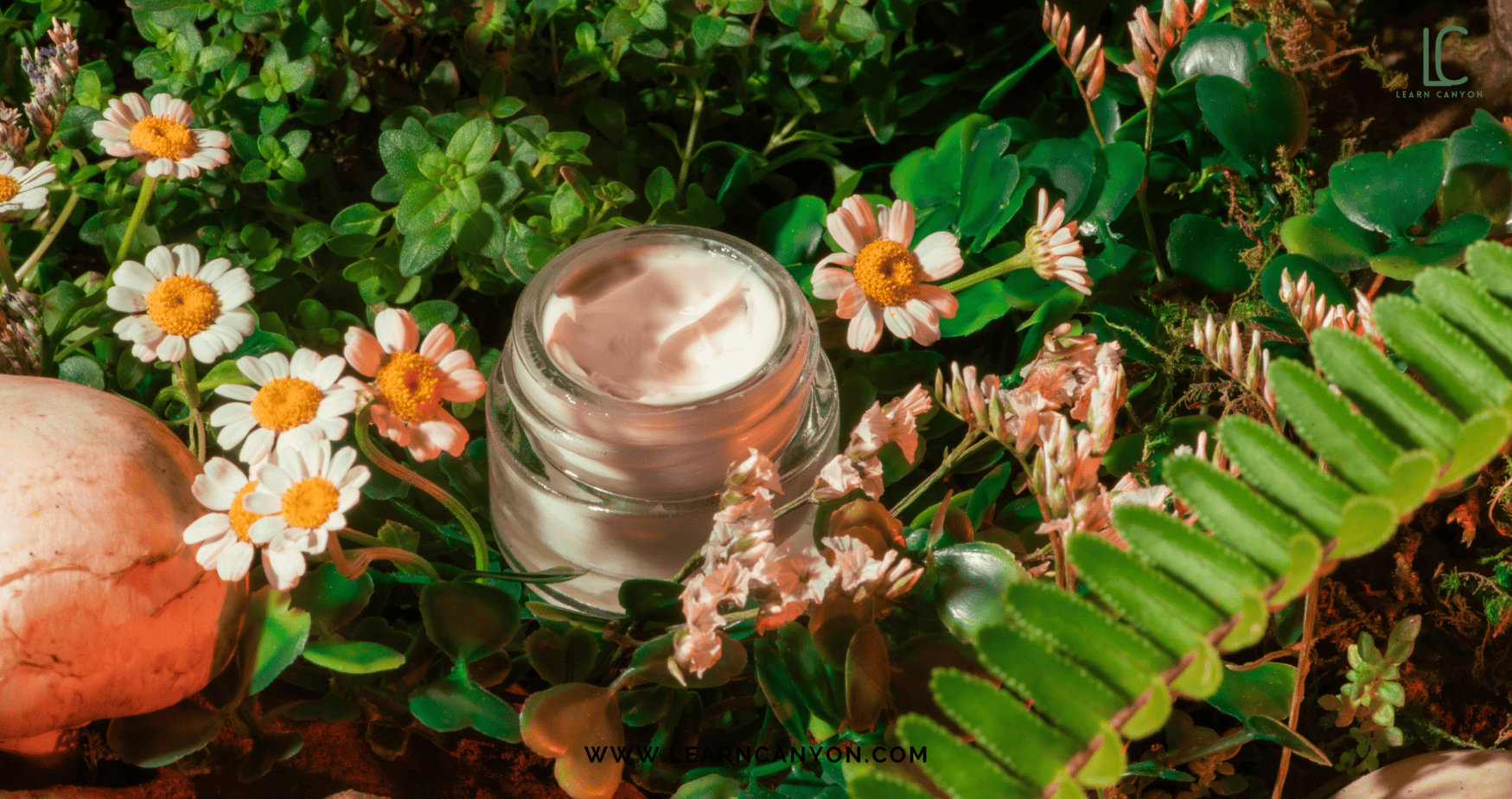
Benefits Of Plant-based Skincare Formulation
Plant-based cosmetics can provide numerous skin health promotions.
As the name suggests, organic skincare formulations are composed of plant-derived substances such as fruits, vegetables, legumes, whole grains, seeds, nuts, and herbs.
Some of those plant-based skincare benefits are;
1. Bioactive Extracts In Skincare Formulations
The application of bioactive extracts or phytochemicals from a variety of plants in cosmetics plays a major role in plant-based skincare benefits: body care and as ingredients to impact the biological functioning of the skin, supplying nutrients for healthy skin.
Botanical products are high in vitamins, antioxidants, essential oils and oils, hydrocolloids, proteins, terpenoids, and other bioactive substances. Such extracts can have a variety of qualities depending on their structure.
Antioxidant Activity
The topical use of antioxidants is an effective technique for enriching the endogenous cutaneous system, resulting in a reduction in UV-radiation-driven oxidative damage.
Phenolic compounds are bioactive chemicals found in plants that are key components of the human food supply. Plant phenolics include a wide range of chemicals, including flavonoids (anthocyanins, flavonols, flavones, and so on) and various non-flavonoids (phenolic acids, lignins, and stilbenes).
Phenolic-rich plants, for example, could be utilised to protect the skin from the detrimental effects of UV radiation, such as ageing, skin cancers, wrinkles and solar elastosis. These extracts can provide phenolic chemicals to the body as dietary supplements and skincare cosmetics.
Inhibition Effect Of Tyrosinase
Melanin is a human pigment that determines the colour of one’s eyes, hair, and skin.
Melanocytes, which are found in the dermal basal layer, synthesise and secrete it through a physiological process known as melanogenesis.
The activation of tyrosinase, a crucial enzyme in melanogenesis, occurs when the skin is exposed to UV radiation. Tyrosinase overactivity causes melanin overproduction. Skin problems such as melasma, freckles, and senile lentigo are caused by abnormal melanin pigment buildup and biosynthesis.
Chemicals that limit the catalytic activity of tyrosinase and affect the synthesis or discharge of melanin pigments have been sought. Tyrosinase inhibitors used today include kojic acid, arbutin, and various vegetal or plant extracts.
Flavonoids have a pigment-reducing impact because of their ROS-scavenging activity and ability to chelate metals at the active site of metalloenzymes. A variety of flavonoids, including aloesin, hydroxystilbene derivates, and liquorice extracts, are commonly employed in skin-lightening preparations.
Antimicrobial activity
The cosmetic and pharmaceutical industries are increasingly interested in replacing synthetic antimicrobials in topical applications.
Aside from the growing public interest in natural agents, microorganism resistance to conventional antimicrobials is increasing.
As natural antimicrobials, phenolic compounds may extend the shelf life of certain items by suppressing the growth of pathogenic microbes. This is the situation with pequi (Caryocar brasiliense Camb), a typical Brazilian fruit tree.
The hydroethanolic extract of their leaves exhibited antibacterial action against Escherichia coli, Enterococcus faecalis, Pseudomonas aeruginosa, and Staphylococcus aureus.
Use Of Phytonutrients
Phytonutrients give a relaxing effect, reduce the sensation of rashes, and contribute to the appearance of even skin tone.
These substances also aid in enhancing the signs of ageing and make skin look revitalised and healthy.
Plant-based skincare is also suitable for use on skin with acne, eczema, hyperpigmentation, allergies, and other issues.
Fruits, vegetables, legumes, and grains contain phytonutrients. Some phytonutrient-rich substances available in plant-powered cosmetics range from the regularly used green tea extract and rosehip oil to the more exotic uva ursi, also known as bearberry, which we employ to achieve the look of an even skin tone.
2. Safe And Gentle On Skin
Plant-based skincare products use plant extracts or concentrates produced with plant extract-based ingredients, which is why they are carefully crafted and free of harsh chemicals that could harm your delicate skin.
They include active components that most synthetic skincare does not, which is why plant skincare is more expensive, but its efficacy is noteworthy.
Vegan skincare products, as opposed to chemical-based skincare products, are more gentle and are founded on the principle of returning to nature.
These organic skincare formulations can boost the skin’s vigour, strengthen its protective function, and be gentler and safer for the skin due to the proportioning of skincare elements and the energy obtained from plants.
3. Quick Absorption
Vegan skincare products are known for their quick absorption and skin permeability.
These products as opposed to mineral-based skincare, have an energising and mild structure that penetrates the inner layer of your skin to provide a deep moisturising effect.
Furthermore, plant-based skincare solutions are packed with smaller, more easily ingested plant molecules.
Their extracts in skincare products have high levels of penetration due to their fast absorption processes.
4. Provides Support To Skin Microbiome
One of the major plant-based skincare benefits is, it supports the skin microbiota. Your skin microbiome is a bacterial habitat on the skin’s surface.
According to research, prolonged exposure to synthetic substances strips the skin of essential microorganisms and suppresses the skin microbiome.
Plant components, on the other hand, offer a superior effect, enhancing the sense of balanced hydration and skin health.
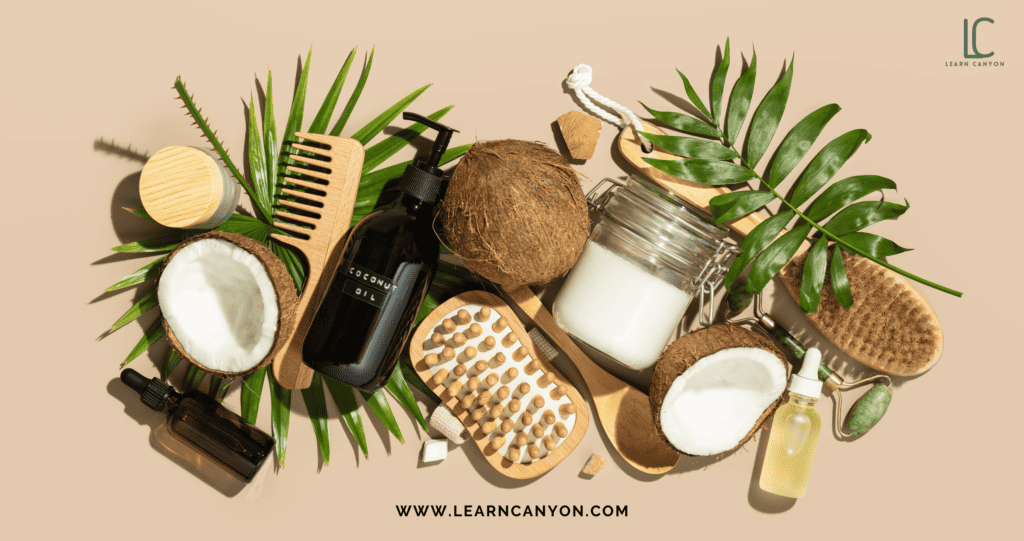
5. Absence Of Drying Agents
Plant-based skincare benefits also include the absence of drying ingredients such as sulphates, resulting in gentleness on your skin.
If you have dry skin, vegan cosmetics will be more effective than synthetic skincare which claims to moisturise and hydrate your skin.
6. Environmental-Friendly
Plant-based beauty products also appear to be environmentally friendly by encouraging consumers to go ecologically conscious and create an eco-friendly environment.
Plant-based goods encourage sustainable cosmetics by avoiding hazardous aspects that most luxury brands claim, whether it’s incredibly gorgeous eco-friendly packaging and products or environmentally responsible sourcing, manufacturing, and selling procedures.
7. Cruelty-Free
Most skincare and make-up products are created through aggressive animal experimentation, making it impossible to determine which beauty goods are ethical or not because they are not compelled to tell you the same.
However, several indicators on the labels indicate if a product is vegan-friendly or not. A vegan society logo or terms such as “cruelty-free” or “not tested on animals” can assist you in selecting an animal-friendly product.
Highly Beneficial Plant Extracts
- Green-Tea Leaf Extract: It is an excellent anti-ageing skincare component rich in polyphenols, alkaloids, and amino acids.
It contains L-theanine, which is a stress-relieving component that may aid in relaxing the body and soothing the skin.
- Olive Extract: Polyphenols are natural compounds found in olive fruit having anti-inflammatory and antioxidant effects.
Antioxidants aid in the oxidation of possibly hazardous free radicals. Providing photoprotection to UV-exposed skin while fighting against collagen erosion.
- Bamboo Extracts: This contains Silica, commonly known as silicon dioxide, which is a naturally occurring chemical that may have anti-inflammatory and skin-soothing properties.
Also functions as a skin detoxifier, assisting in the removal of pollutants and other debris from the skin’s surface and hair follicles.
- Jojoba Esters: This plant extract is well-known for its moisturising properties.
- Grapeseed Extracts: It is used to treat acne as well as oily and mixed skin. The compounds in grapeseed help to counteract the effects of ageing skin.
Apart from such beneficial factors of plant-based skincare formulations, formulators also face intense challenges in developing natural formulations….
Let’s check out certain challenges below;
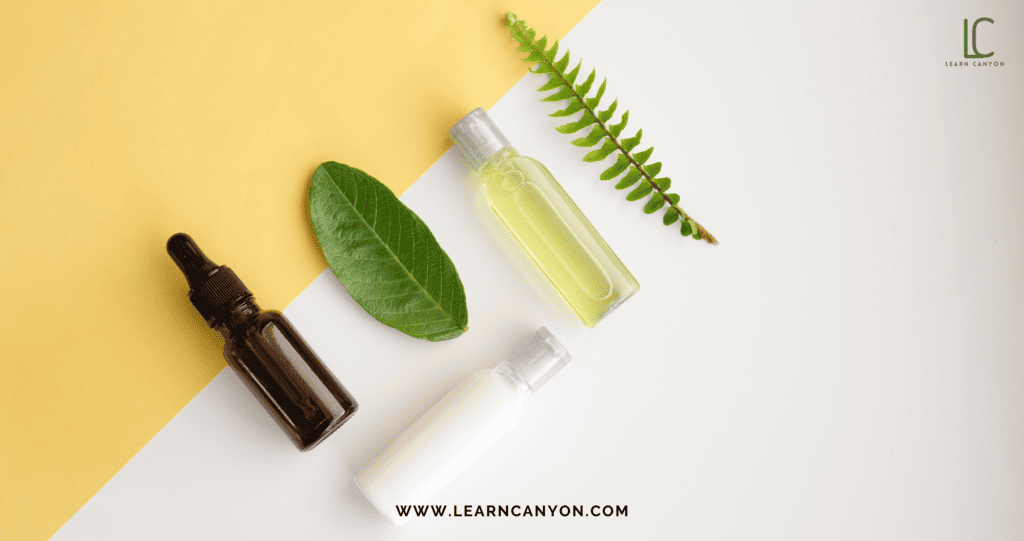
Challenges Of Plant-based Skincare Formulation
While consumers may claim to use green or natural cosmetics, what they truly want are products that truly work.
Formulating natural cosmetics becomes challenging since natural or naturally derived ingredients sometimes do not perform effectively as compared to some synthetic chemicals.
Below are the issues that prompted the formation of a new market segment known as Clean Beauty;
1. Unavailability Of Enough Natural Ingredients
One of the major challenges of plant-based cosmetics is committing to natural formulation drastically reduces your formulation possibilities.
The INCI dictionary has a list of over 22,000 distinct compounds that can be used in cosmetics. Perhaps 10% would be considered natural and the rest are not confirmed yet.
Most natural standards organisations and retailers now make exceptions and allow formulators to include synthetic components that appear natural, hence expanding the actual ingredient pallet.
However, if you want to be an ecological purist, there aren’t truly many options.
2. Vegan Ingredients Don’t Work So Wel
Surfactants
Another issue with plant-based skincare formulations is that the substances available are not always the most functional.
For example, if you wanted a completely natural, earth-friendly surfactant, the only actual option is a saponin derived from the berries of a soapnut tree. These are not as effective as synthetic surfactants and are more difficult to work with.
Unfortunately, formulators who discovered employing saponins for washing products or skin cleansing products have been dissatisfied with their performance.
Many surfactants are permitted if you follow the COSMOS standard. Lauryl glucoside, decyl glucoside, caprylyl/decyl glucoside, coco glucoside, and cocamidopropyl betaine are the most common ones used in cleansing products.
Surprisingly, the COSMOS standard allows for the use of sodium lauryl sulphate (SLS) because it can be generated from natural sources.
Colourants
The vast majority of permitted colourants are made from synthetic substances.
Even so-called mineral makeup elements like iron oxides, zinc oxide, and titanium dioxide are all manufactured.
Although these substances are found in nature, the only permitted versions must be synthesised in a laboratory. This is because naturally occurring minerals include harmful naturally occurring heavy metals such as lead, cobalt, and arsenic.
The synthetic equivalents are far less contaminated.
Some natural colourants, such as annatto, chlorophyllin, carmine, henna, and caramel, do not require FDA certification. Unfortunately, the choice of colourants available from these substances is limited and can cause health risks.
Preservatives
Including preservatives is one of the undeniable challenges of plant-based cosmetics where it gets more difficult when using natural products to keep cosmetics free from contamination and microbial growth because germs might be present in nature.
Excellent preservatives like parabens, formaldehyde donors, and organic chemicals do not match with a sustainable theme, therefore you’ll need substitutes like phenoxyethanol, phenethyl alcohol, organic acids and their salts, benzyl alcohol, and other natural materials.
This challenge is more difficult because natural preservatives have flaws that commercial preservatives do not.
For example, phenoxyethanol and phenethyl alcohol have a distinct odour that is difficult to mask. Organic acids only operate as preservatives at lower pH values, which is inconvenient for several types of plant-based cosmetics.
3. Supply Is Inconsistent
Even if you identify a natural component that works well, you can’t always rely on being able to obtain it.
If you are a smaller brand and there is an issue with any crop shortage, you may be out of luck in terms of obtaining a supply. Maybe you can receive an ingredient that functioned one way one year but didn’t work the next due to factors affecting growth.
4. Plant-based Ingredients Aren’t Always Safe
Plant-based cosmetic formulations are not necessarily safer for you. The safety of a substance has nothing to do with whether it is natural or not.
There are certainly natural ingredients that are safe.
However, some natural ingredients are hazardous. Who wants to massage a blob of poisonous extract on their skin? The substances that trigger the most severe skin reactions are usually natural or naturally sourced.
5. Plant-based Formulations Lack Performance
It is also not true that plant-based cosmetics are more effective. And this is most likely the primary reason for the emergence of Clean beauty.
People can be duped into thinking that their naturally derived substances are healthier for them. Performance, on the other hand, is something that is immediately noticeable.
Consumers can easily detect when a product isn’t performing as well as expected. Buyers can tell when a product feels terrible on their hair or more abrasive on their skin. When it comes down to it, consumers want things that actually work.
They may claim to desire “natural” and ecologically friendly items, but they truly want products that are efficient and pleasant to use.
6. Lack Of Proper Efficacy Testing And Assessments
Now this too is one of the huge challenges of plant-based cosmetics, where insufficient data is unavailable to ensure the secure use of raw materials and components.
Those are as follows;
- The toxicological profile, literature search for new ingredients without INCI, pre-evaluation and pre-expertise help, selection of essential tests, COSMOS folder, NATRUE folder, labelling review, and computation of transparency scale.
- Physicochemical analyses (heavy metals, allergens, residual solvents, pesticides, protein assay, sugar determination, furocoumarin, vitamins…)
- Skin irritation, ocular irritation, sensitising potential, phototoxicity, genotoxicity, endocrine disruptors, and transcutaneous/percutaneous transit.
- Therapeutic effectiveness and clinical tolerance evaluation.
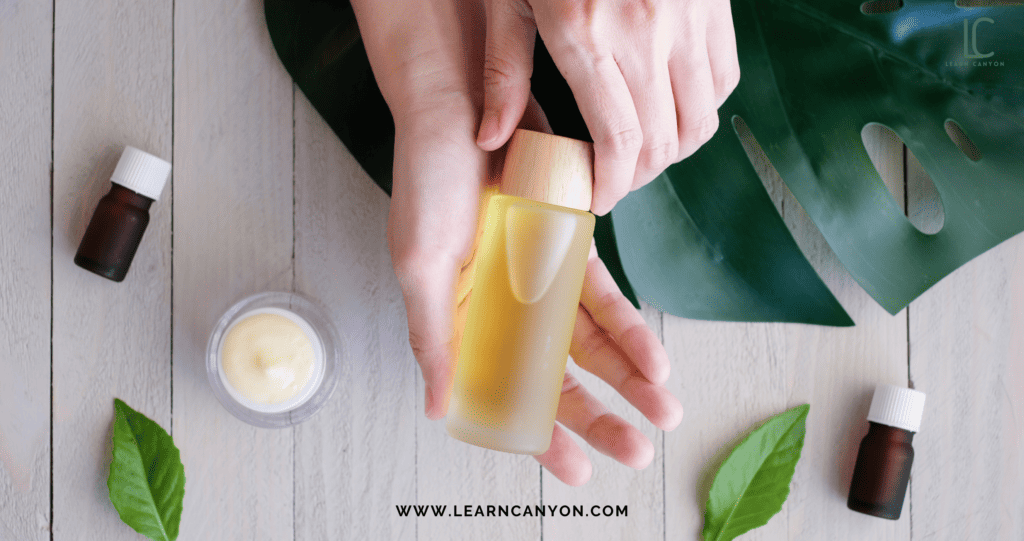
Final Thoughts
From the above points, it can be concluded that skincare organizations must build a strong foundation for developing certain core strategies and techniques to provide customers with more practical clarity of how plant-based skincare formulations come with both benefits and challenges and how they can apply certain methodologies to create effective cosmetics by a using botanical ingredients along with synthetic ones in a balanced way to satisfy their consumers accordingly.
That’s why we need to understand that plant-based cosmetics come with pros and cons, yet consumers are being so brainwashed by the term “ Clean Beauty ” that they have a hard time accepting that organic cosmetics have disadvantages too.
We at Learn Canyon, help our formulators and learners understand the significance of such plant-based cosmetic formulas by providing them with our most advanced in-depth skincare formulation course where they can learn all strategies, tools and techniques to formulate effectively thereby getting skilled at overcoming such formulation challenges to create products that genuinely work on several skin types.
If you want to learn those techniques, do not hesitate to enrol! We have your back!




